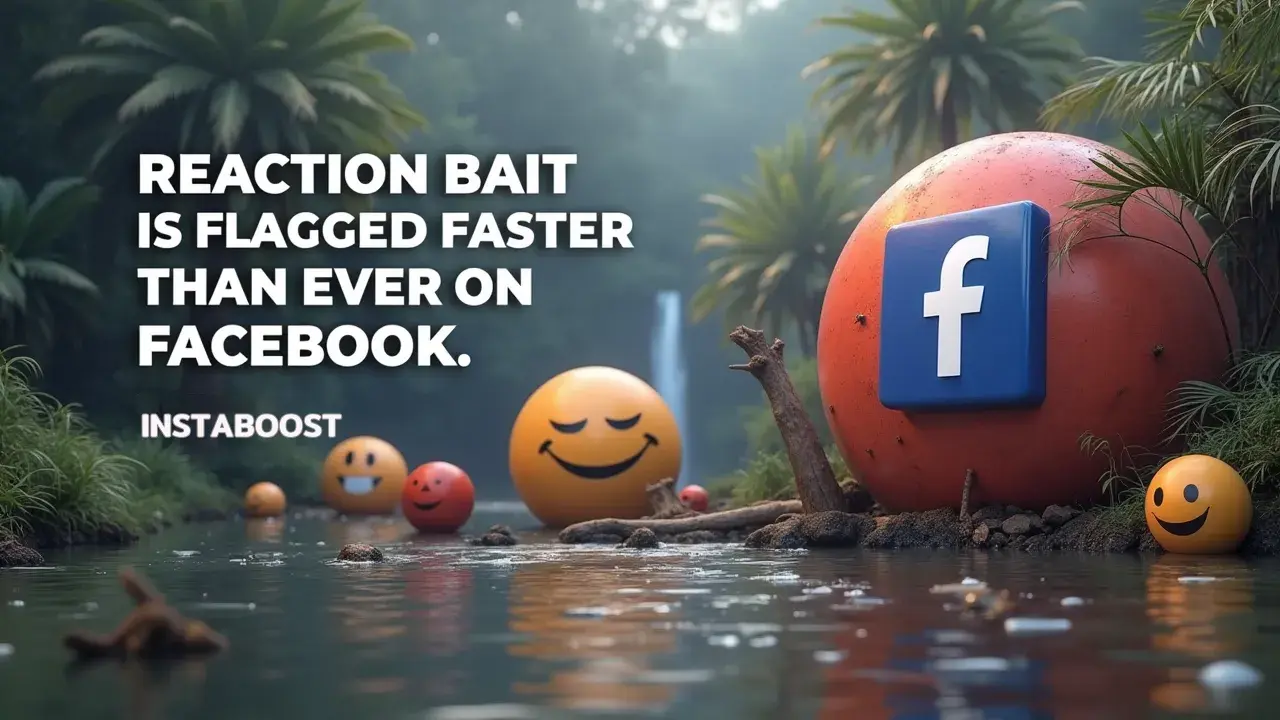Is Reaction Bait Flagged Faster Than Ever on Facebook?
Reaction bait is being identified and flagged more quickly, reducing the visibility of posts that push for artificial engagement. This affects tactics that rely on exaggerated prompts to inflate reactions and can change what appears in your feed. Posts that avoid manipulative cues and focus on genuine interaction are less likely to be deprioritized. Choosing content that naturally earns responses is the smart path to sustained reach.
The Changing Landscape of Facebook Engagement Tactics
When you scroll through Facebook now, it’s pretty clear that things have shifted from how they used to be. Those posts that were always trying to get a “like,” a heart, or an angry face – there aren’t as many of them anymore.
For a long time, it felt like your feed was mostly stuff pushing you to react quickly, almost like it was designed to trigger something in you, whether that was annoyance or quick amusement. It made conversations feel shallow, and everything moved so fast that it was hard to find anything worth slowing down for.
For a long time, it felt like your feed was mostly stuff pushing you to react quickly, almost like it was designed to trigger something in you, whether that was annoyance or quick amusement. It made conversations feel shallow, and everything moved so fast that it was hard to find anything worth slowing down for.
But lately, Facebook seems to be picking up on these manipulative posts more often, and they’re showing up less. It goes deeper than just cleaning up your feed. The platform is changing how it decides what’s important – moving away from counting emotional clicks as the main thing that matters. For people who run pages or businesses, the old approach of stirring up controversy or going for outrage to get seen doesn’t really pay off the way it used to. Even the usual tricks people relied on to drive more Facebook engagement seem to have lost their edge as the algorithm evolves.
And for the rest of us, the feed starts to feel a little more genuine, since the obvious bait isn’t taking up so much space. With the algorithm shifting, everyone – whether you post for work or just to keep in touch – has to think a bit more about what actually matters to share. Now, it’s less about trying to get a reaction and more about finding something real to talk about or connect over. It changes what ends up in front of you, and probably has some effect on how the whole place feels, even if it’s something you only notice after a while.

Why Facebook’s Tools Are Finally Catching Up
It’s interesting how small changes can shift things in a big way. Those posts on Facebook that are always asking for a reaction – like pushing you to hit “like” or toss in an angry face – have been around for ages. What’s shifted isn’t so much Facebook’s rules but how its systems are picking up on those posts.
A few years back, the tools were pretty basic. Sometimes, they’d overlook the posts that were obviously fishing for clicks, or they’d end up flagging someone who was just chatting with friends. Now, things have been tuned a bit. Facebook’s AI has learned to pay attention to stuff like how something’s worded, what the post is trying to do, and even the mood behind it. It’s not only looking for phrases like “Like if you agree!” but also picking up on the way a post is trying to steer you.
Most of the time, that kind of reaction-bait doesn’t even show up in the feed anymore. People seem less annoyed lately, maybe because there’s less of that forced drama. And even though there are still odd corners of the internet where people talk about tricks or services – like buy Facebook followers fast – it seems these days being straightforward works out better than trying to nudge the algorithm. It’s a quieter kind of change, but it does feel nicer scrolling through when things aren’t constantly pushing your buttons.
Building Sustainable Engagement Beyond Reaction Bait
You don’t have to jump on every new trend to get somewhere. Most of the time, chasing quick reactions just leads you in circles – especially since Facebook is getting better at picking up on posts that push for likes or reactions. What seems to work better now is when you actually spark conversations that matter to people, instead of encouraging them to tap an emoji. These days, if you want your posts to reach more people, it helps to focus on being genuine and going a bit deeper. For example, when a post leads to real discussion or when someone feels like your story actually relates to their life, it’s more likely to do well in the algorithm.
On the other hand, if you’re only asking for a “like” or hoping someone clicks an “angry” face, Facebook is more likely to filter it out (even though you still see people buy Facebook likes fast or chase numbers). So, asking open-ended questions or bringing up topics that your community cares about tends to get more thoughtful responses. People usually join in because they want to, not because they feel nudged. If you run Facebook Lives or manage a page, it’s probably worth shifting your focus from counting reactions to building a group of people who actually want to stay involved. That seems to be where things are heading anyway. If you’re trying to get more interaction during a live, offering something useful – like sharing a tip you’ve learned, encouraging real questions, or replying directly – can make more of a difference than any reaction bait. In the end, it’s less about finding ways around the system and more about showing up in a way that feels worth people’s time.
When Burning Bridges Is Smarter Than Playing Along
I didn’t just tweak a few things – I really let go of how I used to do things. When I saw that Facebook was picking up on reaction bait posts so quickly, it finally sank in that those little tricks weren’t worth it anymore. It’s easy to want to outsmart the system or try to make your posts a bit more subtle, but always looking for the next loophole means you’re letting the algorithm shape how you reach people.
And after a while, that feels pointless. People running Facebook Lives or managing groups have already seen how these automated systems don’t just flag obvious stuff, they start to squeeze out whole ways of connecting. There’s always someone suggesting shortcuts – sometimes I hear about things like ways to buy views for viral content – but in the end, that can leave you chasing numbers instead of real interactions.
So instead of forever adjusting and second-guessing what might get flagged, I figured it was better to stop relying on reaction bait altogether. Now, I try to focus on things that actually start a conversation – asking real questions about people’s experiences, sharing moments that mattered to me, or listening to what’s going on in the group. Likes and reactions might dip at first, but the people who stick around are the ones who actually care about what’s being said.
As Facebook’s detection tools get sharper, anyone still chasing the old tricks is probably going to end up frustrated and tired. For me, moving away from reaction bait wasn’t about giving up on engagement. It was about making sure that when people did respond, it actually meant something. And when you clear out those habits, it’s surprising how much more real the conversations start to feel.
Letting Your Own Pace Set the Tone
Sometimes when things get quiet online, it’s not just silence – it’s a moment where you can check in with yourself and notice what you actually want to say. Lately, with Facebook flagging posts for reaction bait more quickly, it feels like a good time to stop and think before hitting share. It’s easy to get caught up in whatever’s getting the most attention, but after a while, chasing those quick likes starts to feel empty.
Platforms change their rules all the time, and the numbers go up and down, but you’re still the one choosing what you want out there. Whether you’re experimenting with ways to reach more users with Facebook shares or just posting for friends, it might help to focus on the kinds of exchanges you’d actually care about if you ran into someone in person – conversations that mean something, not just a pile of fast thumbs-up. Skipping the urge to look for instant reactions makes room for a different kind of connection, one that feels more genuine and sticks with you. It’s not the sort of thing that disappears the next time Facebook changes how it works. While a lot of people are still looking for the next shortcut, you can use your posts to start something that stays with people, even if it’s only a few of them, even if there’s no big spike in the numbers.
Shaping Engagement Beyond the Algorithm
Facebook's gotten a lot better at catching those posts that are mainly there to get a reaction out of you. It’s not only about the algorithm updates – it feels like the platform is nudging us to pay more attention to what actually counts as meaningful engagement. Now that it’s much harder to get away with posts designed only for likes or angry faces, everyone – from people with huge followings to folks posting to their friends – has to think a bit more about what they put up. Chasing quick likes can be hard to resist, especially when so much on Facebook still revolves around numbers and visible feedback (I mean, it’s not like it’s hard to grow your reaction count on Facebook if you really want to).
But I’ve noticed that when you’re not constantly trying to beat the system, there’s a little less pressure. There’s more space to do things like watch a Facebook Live and actually read what people are saying in the comments, or share something because it matters to you, even if it doesn't get tons of emojis. The pace on my feed feels slower, and I notice conversations stick around a bit longer instead of disappearing after a spike of activity. I’m not expecting everything to turn completely sincere, or pretending things used to be better, but seeing less reaction-bait does make Facebook feel a bit calmer. If you’re hoping for a space that’s more about staying connected than putting on a show, it’s something to pay attention to. The technology’s getting sharper, but so is the feeling that real conversations might be a little easier to find now.















